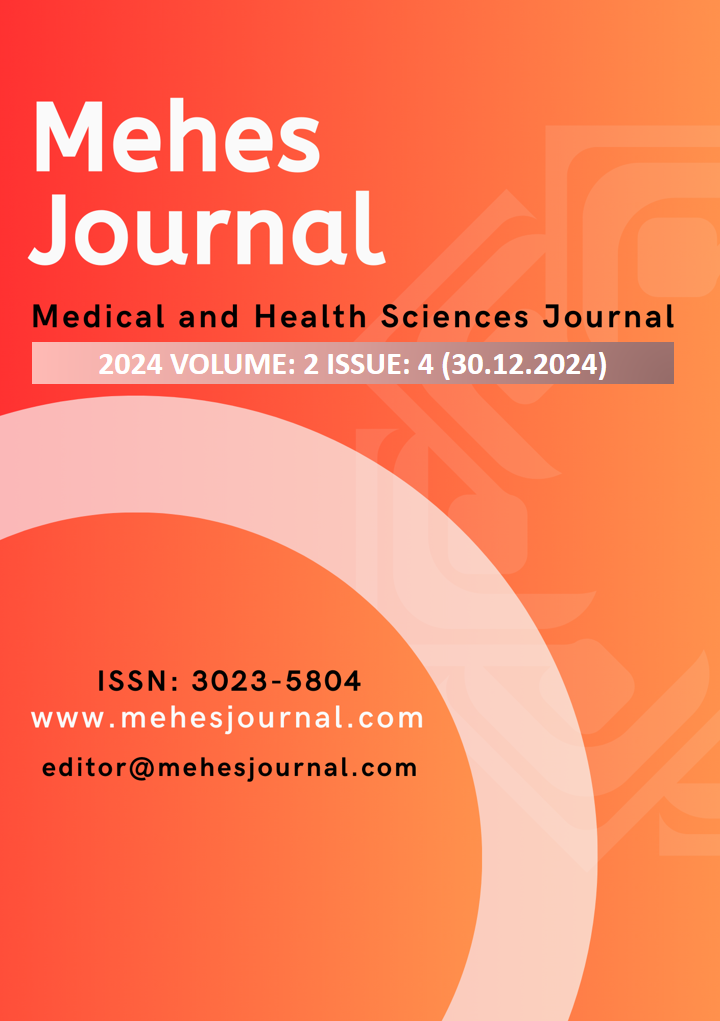Knowledge Levels Of Cardiovascular Surgery Intensive Care Nurses About Delirium
DOI:
https://doi.org/10.5281/zenodo.14569278Keywords:
Cardiovascular Surgical Procedures, Intensive Care, Delirium, NursingAbstract
Objective: This study was carried out in a descriptive study designed to examine nurses knowledge level about delirium working in the cardiovascular surgery intensive care unit.
Materials and Methods: The research was conducted at a training and research hospital in Istanbul. A total of 73 nurses working in the cardiovascular surgery intensive care unit participated voluntarily. Data were collected using the "Sociodemographic and Descriptive Information Form" and the "Delirium Knowledge Test for Intensive Care Nurses," which assesses nurses' knowledge about delirium. Statistical analysis was performed using SPSS 22.0.
Results: The mean "total delirium knowledge score" of the nurses was found to be 18.219 ± 3.888. The sub-dimension scores were as follows: "risk factors and causes of delirium" (6.603 ± 1.963), "delirium symptoms and types" (1.767 ± 0.993), "delirium outcomes" (2.548 ± 0.646), "delirium assessment" (1.863 ± 0.902), and "pharmacological and non-pharmacological management of delirium" (5.438 ± 1.364). The findings indicate that nurses' knowledge levels were generally moderate.
Discussion and Conclusion: While nurses demonstrated sufficient knowledge regarding delirium risk factors and symptoms, deficiencies were observed in the areas of patient evaluation and outcomes of delirium. Moreover, there is a misconception among nurses that non-pharmacological methods are ineffective in managing delirium. These findings highlight the importance of including comprehensive delirium education in nursing training programs, emphasizing practical techniques and theoretical knowledge.
References
Kaya H, Doğu Ö. Yoğun Bakımda Deliryum ve Hemşirelik Bakımı. Journal of Human Rhythm. 2017;3(2):81-84.
Kaya E, Sönmez S, Barlas F. Deliryum. Okmeydanı Tıp Dergisi. 2013; 70-74.
Yılmazer R. Yoğun Bakım Hemşirelerinin Deliryum Hakkındaki Farkındalıkları ve Deliryum Yönetimlerinin İncelenmesi. 2020 Master Thesis. Bursa.
Aslankurt S et al. Açık Kalp Cerrahisi Sonrası Deliryum Sıklığı ve Deksmedetomidin'in Eksikliği. GKDA Dergisi. 2016;22(4);152-160.
Çevik B, Akyüz E, Uğurlu Z, Ersayın A, Doğan N. Yoğun Bakımda Çalışan Hemşirelerin Deliryum Yönetimi Konusunda Farkındalıklarının Belirlenmesi. Başkent Üniversitesi Sağlık Bilimleri Fakültesi Dergisi. 2016; 1(1); 32-46.
Öztürk Birge A, Tel Aydın H, Salman F. The development of a delirium knowledge test for intensive care nurses: A validity and reliability study. Intensive & Critical Care Nursing. 2020;61;102900
Akarsu Ayazoğlu T, Tür H, Bolat C, Özkaynak İ, Candan MA. Yaşlılarda Kardiyak Cerrahi Sonrası Yoğun Bakımda Deliryum Prevalansı ve Risk Faktörleri. Journal of Experimental and Clinical Medicine. 2011;101-107.
Özkan S, Boyacıoğlu N. The Effect of noise on Patients in Intensive Care Unit. Journal of Nursing Science. 2018;1(1); 27-32.
Morita T, Tei Y, Inoue S. Agitated terminal delirium and association with partial opioid substitution and hydration. Journal of Palliative Medicine. 2003; 6(4); 557-563.
Needham DM, Korupolu R, Zanni JM, Pradhan P, Colantuoni E, Palmer JB, Brower RG, Fan E. Early physical medicine and rehabilitation for patients with acute respiratory failure: a quality improvement project. Arch Phys Med Rehabil. 2010;91(4):536-42.
Schweickert WD et al. Early physical and occupational therapy in mechanically ventilated, critically ill patients: a randomised controlled trial. Lancet. 2009; (373): 1874-1882.
Rompaey BV, Elsevires MM, Drom WV, Fromont V, Jorens PG. The effect of earplugs during the night on the onset of delirium and sleep perception: a randomized controlled trial in intensive care patients. Critical care. 2012; (16); R73
Thompson DR, Hamilton DK, Cadenhead CD, Swoboda SM, Schwindel SM, Anderson DC, Schmitz EV, St Andre AC, Axon DC, Harrell JW, Harvey MA, Howard A, Kaufman DC, Petersen C. Guidelines for intensive care unit design. Crit Care Med. 2012;40(5):1586-600.
Ateş A. Yoğun Bakım Ünitesinde Hemşirelik Tanılaması ile Deliryum Riskinin Belirlenmesi. 2012. Master Thesis. İstanbul.
Başpınar T. Cerrahi Yoğun Bakım Ünitesinde Çalışan Hemşirelerin Deliryuma Yönelik Bilgi, Tutum ve Bakım uygulamalarının Değerlendirilmesi. 2019.Master Thesis. İstanbul.
Kırkpınar İ. Dahili ve Cerrahi Tıpta Deliryumun Değerlendirilmesi ve Yönetimi: Bir Gözden Geçirme. Bezmialem Science. 2016;(3);113-122.
Akıncı SB & Şahin A. Yoğun Bakımda Deliryum. Yoğun Bakım Dergisi.2005; 5(1);26-35.
Şahin H. Bir Üniversite Hastanesinde Çalışan Hemşirelerin Deliryum Hakkındaki Bilgi ve Tutumlarının Araştırılması. 2019: Master Thesis. Trabzon.
Çetin HB. Hemşirelerin Deliryum Yönetimine Yönelik Bilgi, Uygulamaları ve Etkileyen Faktörlerin Belirlenmesi.2018: Master Thesis. İstanbul.
Temiz Z, Sayılan Aydın A. Yoğun Bakım Hemşirelerinin Deliryum Bilgi Düzeylerinin Değerlendirilmesi. Türkiye klinikleri Hemşirelik Bilimleri Dergisi. 2021;13(4); 751-8.
Başpınar T. Cerrahi Yoğun Bakım Ünitesinde Çalışan Hemşirelerin Deliryuma Yönelik Bilgi, Tutum ve Bakım uygulamalarının Değerlendirilmesi. 2019: Master Thesis. İstanbul.
Oosterhouse KJ, Vincent C, Foreman MD, Gruss VA, Corte C & Berger B. Intensive Care Unit Nurses' Beliefs About Delirium Assessment and Management . American Association of Critical-Care Nurses. 2016;27(4); 379-393.
Demir Korkmaz F, Gök F, Yavuz Karamanoğlu A. Cardiovascular surgery nurses' level of knowledge regarding delirium. Nursing in critical care. 2016;21(5); 279-286.
Rivosecchi RM, Kane-Gill SL, Svec S, Campbell S & Smithburger PL. The implementation of a nonpharmacologic protocol to prevent intensive care delirium. Journal of Citical Care. 2016; 31(1); 206-211.
Colombo R, Corona A, Praga F, Minari C, Giannotti C, Castelli A, Raimondi F. A reorientation strategy for reducing delirium in the critically ill. Results of an interventional study. Minerva Anestesiol. 2012;78(9);1026-33.
Ateş, A. Yoğun Bakım Ünitesinde Hemşirelik Tanılaması ile Deliryum Riskinin Belirlenmesi. 2012: Master Thesis. İstanbul.
Downloads
Published
How to Cite
Issue
Section
License
Copyright (c) 2024 MEHES JOURNAL

This work is licensed under a Creative Commons Attribution 4.0 International License.










